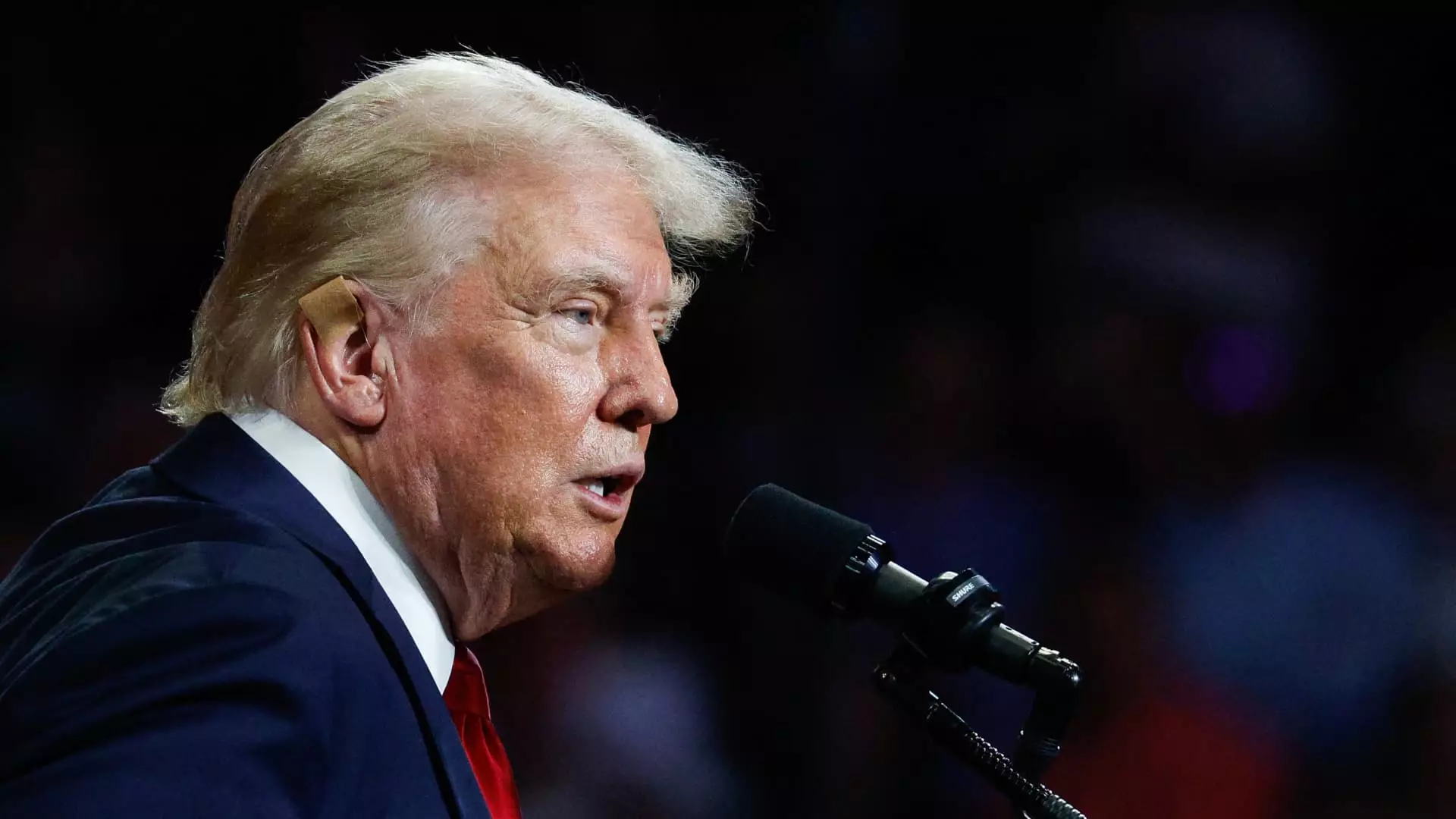In a rapidly evolving landscape where cryptocurrencies like Bitcoin are increasingly influencing economic and political dialogues, former President Donald Trump’s keynote speech at this year’s Bitcoin Conference in Nashville presented a mix of promise and caution. Trump’s remarks were particularly notable as they provided a glimpse into the potential direction of U.S. policy on cryptocurrency, as well as the underlying tension between innovation and regulation in the digital financial realm.
Rather than unveiling a groundbreaking plan to establish a strategic U.S. bitcoin reserve, Trump opted to focus on the current holdings of bitcoin amassed through asset seizures from financial criminals, declaring that his administration would strive to maintain these assets rather than liquidate them. “For too long our government has violated the cardinal rule that every bitcoiner knows by heart: Never sell your bitcoin,” Trump stated emphatically. This sentiment aligns with a common principle held by many cryptocurrency enthusiasts who advocate for long-term holding strategies despite market fluctuations.
Trump’s stance diverges significantly from the current practices of the U.S. Marshals Service, which regularly auctions off seized bitcoins and other cryptocurrencies. These sales can exert significant price pressure on the market, a situation witnessed recently when Germany liquidated a substantial amount of its bitcoin holdings. Trump’s advocacy for a policy shift to permanently retain bitcoin aligns with the growing sentiment in crypto circles, highlighting his awareness of the growing importance of stable asset management in the cryptocurrency space.
While many in the crypto community may have been hoping for a more revolutionary proposal, Trump’s lack of ambition could be interpreted as either a missed opportunity or a pragmatic approach to governance. In contrast, Robert F. Kennedy Jr., running as a third-party candidate, presented a more aggressive plan, suggesting a significant purchase of 4 million bitcoins to create a reserve akin to Fort Knox for gold. This ambitious vision echoes the sentiments of ultra-conservative stances that lean toward Bitcoin as a fundamental currency alternative in the American landscape.
Kennedy’s proposals, which include daily purchases of 550 bitcoins, contrast sharply with Trump’s quieter, more cautious strategy, emphasizing the political rift surrounding cryptocurrency policy. While Kennedy’s vision casts him as a forward-thinking candidate prepared to embrace disruptive economic changes, Trump’s positioning may appeal to more traditional voters who value stability over volatility in economic policy.
Legislative Pathways and the Complexities of a Bitcoin Reserve
One of the core elements of Trump’s remarks involved the complexities of implementing a U.S. bitcoin reserve. The former president hinted at the significant legislative hurdles that would accompany such a strategic initiative. Establishing a recognized bitcoin reserve would necessitate new legislation and likely sparking a long, arduous process through Congress. Following this discussion, Senator Cynthia Lummis announced plans to introduce legislation aimed at acquiring a million bitcoins over five years, thus throwing the weight of legislative intent behind the notion of a national reserve.
Lummis proposes that the Treasury would leverage existing funds to assemble this reserve, an effort positioned primarily as a hedge against inflation and a mechanism to reduce national debt. This legislative endeavor suggests a strategic pivot for Republicans who are recognizing the increasing relevance of Bitcoin and cryptocurrencies in the national financial conversation, illustrating a party ready to embrace digital currencies despite historical opposition.
The potential for a national bitcoin reserve raises significant questions about the future of Bitcoin in both domestic and global markets. Should the U.S. manage to establish and maintain a significant reserve, it would confer a new level of legitimacy upon Bitcoin, reinforcing its status as a recognized asset class. The recent approval of Bitcoin exchange-traded funds (ETFs) by the Securities and Exchange Commission signifies a shift towards greater institutional acceptance, yet a formal reserve would represent an entirely new chapter in the relationship between government policy and cryptocurrencies.
It is clear that if a coordinated U.S. effort toward Bitcoin investment occurs, other nations may follow suit, further tightening supply in the already volatile market. Expert commentary suggests that such movements would likely lead to a price surge, solidifying the potential for Bitcoin to act not just as a speculative asset but as a vital component of national economic strategy.
Trump’s lukewarm offer regarding the future of Bitcoin points to a broader political and economic strategy in a country still wrestling with the implications of a rapidly digitizing economy. While Trump’s moderation stands in contrast to Kennedy’s ambitious proposals, both serve to highlight the increasing political awareness of cryptocurrencies as an integral element of modern economic policy. As America gears up for upcoming election cycles, the articulation of robust cryptocurrency strategies may define not only party lines but also the financial landscapes of the future. The ongoing discourse not only encapsulates current tensions but may well set the stage for Bitcoin’s role in a larger financial narrative.


Leave a Reply